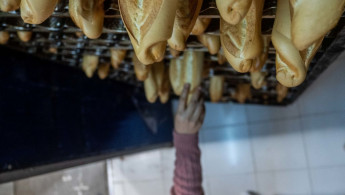Thousands of Tunisia bakers strike over unpaid subsidies
Thousands of Tunisian bakers began an open-ended strike on Wednesday to demand fees the state owes them for producing subsidised bread as the country faces a grave economic crisis.
The national bakery owners' union said some 3,200 of their businesses had closed, representing 95 percent of the North African country's state-backed bakeries.
They are demanding payment of 14 months of overdue subsidies, adding up to around 250 million dinars (nearly $78 million), the union said.
A further 1,200 bakeries that do not receive subsidies are functioning normally.
Several dozen bakery owners staged a protest on Wednesday outside the headquarters of the UTICA business lobby group in the capital Tunis.
"It's been more than a year that we've been paying from our pockets to produce bread, we've had enough," said Najib Mouhamadi, who owns a bakery employing six people in the northeastern province of Nabeul.
Tunisia is in the throes of a public finance crisis that has caused repeated shortages of subsidised flour, sugar and other basic goods.
That comes years into a grinding economic downturn exacerbated by inflation that hit nine percent in August year-on-year.
Last week, drivers in Tunis formed long queues at petrol stations as fuel deliveries faltered, stirring anger against the government of President Kais Saied who has installed one-man rule since staging a dramatic power grab in July 2021.
Tunisia is in talks with the International Monetary Fund for a $1.9-billion loan that would also allow it to access international creditors, hitherto spooked by the country's CCC credit score from ratings agency Fitch.
The loan package, agreed to by IMF experts last week and expected to be approved by the lender's board in December, stipulates that the state gradually scrap the subsidy system and replace it with cash transfers to the neediest households.





 Follow the Middle East's top stories in English at The New Arab on Google News
Follow the Middle East's top stories in English at The New Arab on Google News


